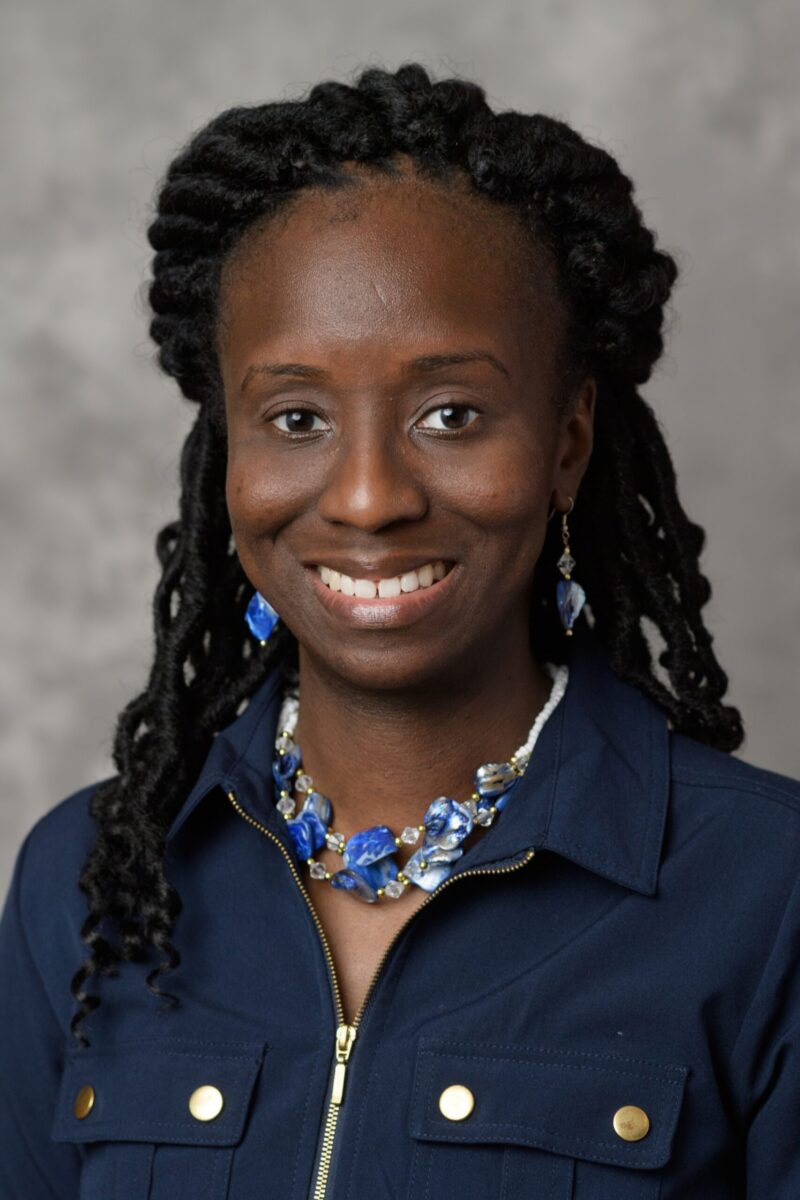Purdue dietitian named inaugural diversity and inclusion fellowship recipient

Marie Allsopp, clinical assistant professor in Purdue University’s Department of Nutrition Science
WEST LAFAYETTE, Ind. — “Why aren’t there more students who look like us?”
That was the question Marie Allsopp received one day from a Black resident in a rural Mississippi Delta community while a group of 10 of her fellow nutrition and dietetics students were on a service-learning visit to Shelby, Mississippi, to deliver nutrition education presentations to community members.
That one question put Allsopp on a journey in search of answers, including new opportunities at a national level to address the need for more registered dietitian nutritionists of color who can relate to diverse communities across the U.S.
Allsopp, a clinical assistant professor in Purdue University’s Department of Nutrition Science, has been named the first diversity and inclusion fellowship recipient by the Academy of Nutrition and Dietetics Foundation. She began the two-year fellowship in June.
In the fellowship, Allsopp plans to identify barriers and solutions that students, registered dietitians and dietetic technicians face, including career advancement. She also will be working to increase diversity in the field and expand access that underrepresented minority students have to dietetics programs across the U.S.
A 2021 survey from the Academy of Nutrition and Dietetics shows a large race and ethnicity gap among nutrition and dietetics professionals. The report shows nearly 90% of professional registered dietitian nutritionists identified as white, 6% as Hispanic or Latino, 6% as Asian, and 3% identified as Black or African American. According to statistics from the Accreditation Council for Education in Nutrition and Dietetics, of the 18,564 students enrolled in a dietetics education program in 2020, 62% identified as white, 15% as Hispanic or Latino, 9% as Asian, and 6% identified as Black or African American.
“Nutrition and dietetics is an unrecognized field to many people, especially people of color. We’re like a hidden gem or one of the best kept secrets. And that’s one of the main questions the fellowship is going to be answering. I know that’s a question many have asked on how to recruit more underrepresented minority students,” Allsopp said. “A lot of students say they haven’t heard about it, or they found out about it by taking another class.”
Allsopp would like to expand outreach into middle schools and high schools to get underrepresented minority students aware of the profession.
Another goal of the fellowship is to address issues students face in completing their programs in college, especially for those who struggle with some science courses, and who are in some instances the only student of color in their class.
“I’m hoping we can make that path a little smoother for students,” she said. “The issues and barriers are also national and not confined to one region.”
Allsopp became a registered dietitian nutritionist in 2003 and has worked in local and state public health departments in Florida and New York respectively. What originally started off as doing community presentations and then teaching at a local college turned into a calling to teach dietetics in academia full-time and give back to the profession.
In the courses Allsopp teaches at Purdue, she talks about the importance of registered dietitian nutritionists and their ability to translate the science of nutrition into practical solutions and recommendations for the lay public through social media and career development, and working with other medical professionals.
Her main hope after her fellowship is completed is simple: She wants to see more diversity across the nutrition and dietetics landscape.
“I am excited. I’ll be stepping out of my comfort zone into something new,” Allsopp said. “It will be new and exciting. I’m expecting the unexpected.”
About Purdue University
Purdue University is a top public research institution developing practical solutions to today’s toughest challenges. Ranked the No. 5 Most Innovative University in the United States by U.S. News & World Report, Purdue delivers world-changing research and out-of-this-world discovery. Committed to hands-on and online, real-world learning, Purdue offers a transformative education to all. Committed to affordability and accessibility, Purdue has frozen tuition and most fees at 2012-13 levels, enabling more students than ever to graduate debt-free. See how Purdue never stops in the persistent pursuit of the next giant leap at https://purdue.edu/.
Writer, Media contact: Matthew Oates, 765-586-7496, oatesw@purdue.edu, @mo_oates
Source: Marie Allsopp, mallsopp@purdue.edu
Journalists visiting campus: Journalists should follow Protect Purdue protocols and the following guidelines:
- Campus is open, but the number of people in spaces may be limited. We will be as accommodating as possible, but you may be asked to step out or report from another location.
- To enable access, particularly to campus buildings, we recommend you contact the Purdue News Service media contact listed on the release to let them know the nature of the visit and where you will be visiting. A News Service representative can facilitate safe access and may escort you on campus.
- Correctly wear face masks inside any campus building, and correctly wear face masks outdoors when social distancing of at least six feet is not possible.
Discover more from News | College of Health and Human Sciences
Subscribe to get the latest posts sent to your email.